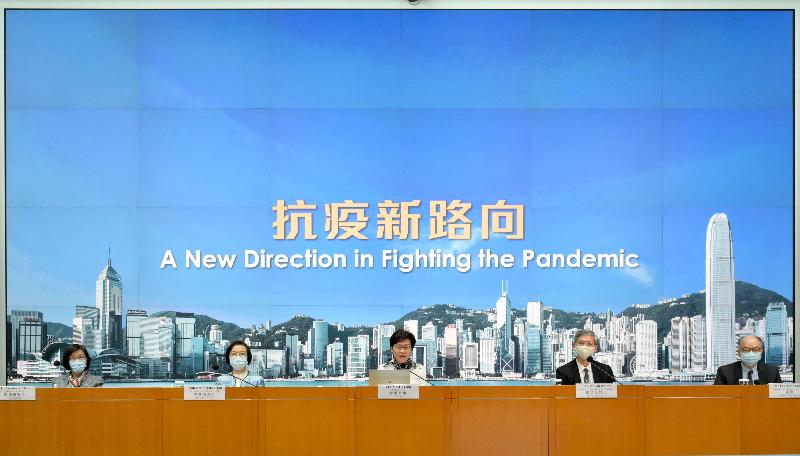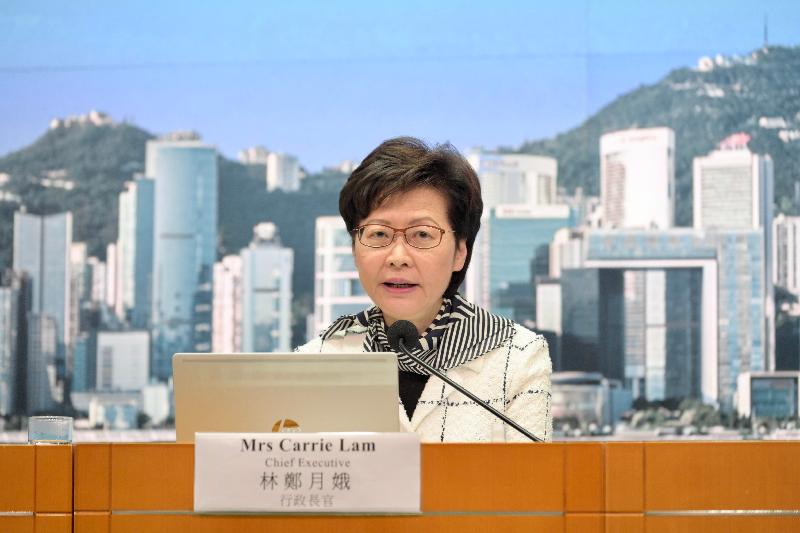Transcript of remarks of press conference (with photos/video)
*************************************************************
Reporter: First, when do you expect this sort of vaccine bubbles can be launched and are you looking to launch it right after this batch of measures expired or are you hoping to see the vaccination rate reach a certain level? And when the vaccination is not fully available to all people in Hong Kong, for example those under 30, is it fair to those who aren't qualified or physically can’t get a vaccine to launch this measure when they can't get a vaccine? Will you guys also see this as sort of a mandatory vaccination drive? Second question regarding the quarantine-free travels from the Mainland to Hong Kong, looking forward at the quotas, what range of amount are we looking at and would these quotas be reserved for business travels only, or emergency travels or there are no limitations? And third batch of questions regarding travel bubble arrangements, has the Government made any progress on those areas especially with travel bubble arrangements with Macao and Singapore and what are your progress on the vaccine passports for Hong Kong so far? Thanks.
Chief Executive: Thank you for the questions. First of all, as far as the vaccine bubble, the way to put it is we are making use of vaccination as a basis for adjusting the social distancing measures as well as the border control measures. We do not need to wait until a certain percentage of Hong Kong population has received vaccination. This vaccine bubble is very much based on the individual behaviour or the group of individuals or the venue-based group of individuals. If you have been vaccinated and all the staff in the restaurant have been vaccinated, then they can enjoy the relaxed measures in terms of the number of customers per table and the operating hours. We do not need to wait until everybody or a certain percentage of the Hong Kong people have been vaccinated, so the concept is very different. The latter that you asked about a certain percentage is what they call the "herd immunity". We are not adopting a herd immunity concept for adjusting the relaxation measures. We are just targeting at individuals. If you do that, or a group of individuals, if you do that, for example if a family of eight persons want to enjoy the dinner together, sitting around a table, then this group of eight individuals, they have all to be vaccinated. That's how we are going about this.
At the moment we have no plan to make vaccination compulsory. I doubt any places will adopt this route because there are all sorts of complications and reasons but I have been convinced – you remember previously I said that the best incentive is to protect yourself and your family - if the community wants the Government to come up with more tangible benefits, so-called incentives, what I have announced today is in that direction. It is true that at the moment the Government Vaccination Programme does not extend to people under 30. I have said that we will seriously consider that because we do have the supply of vaccines but we need to wait for the experts to advise us. We are not denying the under-30s to have a meal in a restaurant, we are just talking about the relaxation. They can still go to cinema. We are not making cinema-goers all vaccinated and so on. This is really striking a balance between, on the one hand, promoting vaccination but on the other hand, also giving people the choices in their daily activities.
For the scheme to allow Mainlanders or people in the Mainland to come to Hong Kong without being subject to the 14-day quarantine arrangement, we will not specify what type of travellers. But they have all to get the quota from the Hong Kong Special Administrative Region Government's scheme, and they will have to have negative COVID-19 test results, then they can come. Within the Mainland, especially for Mainlanders, they have to get all sorts of permits to arrive, whether it is a one-way permit for a family reunion, a business permit for business visit, or an official permit for official visit, but that's not under our scheme, that is really the exit arrangement for Mainlanders. The quota is going to be determined by us, and we hope to be able to tell people this quota once we get the scheme ready for implementation.
For the travel bubble arrangement progress, at the moment, it's only with Singapore because we did have a scheme very much ready for implementation with Singapore before the fourth wave hit us in the latter part of November. I understand that the Commissioner for Tourism has had very good discussions with the Singaporean government and I hope to be able to announce some details very soon.
Reporter: ...when can the vaccine bubbles begin...?
Chief Executive: I have announced that the set of social distancing measures that is in place, which will expire on Thursday (April 15) will be extended for two weeks up to April 28. If all the preparatory work, discussions with stakeholders could be completed well within this two-week period, then they can start to kick in in the next round of these measures. That's our target. I hope that at least, especially to operators of the six types of premises which have been closed really for a very long period, this will give them some encouragement that they can start to get themselves prepared. But I have to put down a rider, if suddenly Hong Kong faces a major surge of COVID-19 cases as a result of the Easter holiday, then we may need to again revisit and refine these measures.
Reporter: Good afternoon, Mrs Lam and other ministers. Few questions from us. How will the "clean zones" work in restaurants, where space can be cramped, and where there is also risk of aerial transmission, which we saw in previous restaurant clusters? Second question is when are the 300,000 doses of BioNTech from Baxter expected to be used up based on the current vaccination rate? Will a new batch be shipped, given that the two suspended ones are still in storage? And how will those two batches be handled? And third, I'd just like to clarify when the relaxation of quarantine requirements for low- and medium-risk countries will take effect. Thank you.
Chief Executive: As far as the details on how individual types of premises will operate under this "vaccine bubble" concept, it will have to be worked out between the Government and the trade in the next few days. But I would envisage that, for example, for a more sizeable restaurant, then they could delineate a certain area within their restaurant as what we call the "clean zone". For customers who want to go into this area and enjoy eight persons table, then they have to be vaccinated, and the staff serving this area, this delineated area, have all to be vaccinated. It much depends on the configuration and the size of a particular restaurant. Some restaurants actually have two floors - then it's quite easy for them to make this delineation.
I will leave the second question to the Secretary for Food and Health and the Director of Health about the supply of BioNTech and so on.
As far as the low- and medium-risk countries, the low-risk countries - that is Singapore, New Zealand and Australia – have already started with a 14-day quarantine instead of 21-day quarantine from April 9, so in due course when we announce this further relaxation based on vaccination, then these three low-risk countries will move on to seven-day instead of 14-day quarantine. I cannot tell you the exact day, we have to work out some of the details. For the medium-risk countries, at the moment, still 21-day quarantine. Again, in due course we will announce that from a day onwards, if you come from these countries, normally we will expect these are the countries that have not had these variants of concern, and from that point onwards they will be subject to 14-day instead of a 21-day quarantine. I want to assure you that we will remain equally vigilant even with the reduced quarantine period by imposing more tests. At the moment it's upon arrival, there is a "test-and-hold" at the airport, and then on the 12th day, on the 19th day. We may adjust the frequency of the tests based on the advice of the experts. I actually met the experts for two hours last Friday and they have given some good advice on how we could adjust these testing frequencies in order to make sure that while on the one hand we reduce the duration of the quarantine, on the other hand we will not leak any of those possible variants into the community.
Secretary for Food and Health: Thank you for your question. As far as the supply of BioNTech vaccines is concerned, you may recall earlier we have received 300 000 doses from Germany. We will be receiving further doses, so there should not be any problem with the supply. Of course we are monitoring the situation very closely because of the challenges on logistics and storage that we are facing. Again, I do not think there is any problem so far with the storage as far as there are planning and arrangements on further delivery of another batch of BioNTech (vaccines).
(Please also refer to the Chinese portion of the transcript.)
Ends/Monday, April 12, 2021
Issued at HKT 22:12
Issued at HKT 22:12
NNNN
Photo
Audio / Video
CE holds press conference






